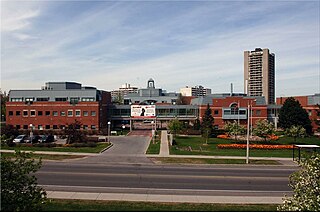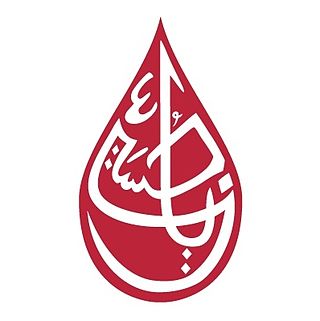Related Research Articles

Organ donation is the process when a person authorizes an organ of their own to be removed and transplanted to another person, legally, either by consent while the donor is alive, through a legal authorization for deceased donation made prior to death, or for deceased donations through the authorization by the legal next of kin.

A blood donation occurs when a person voluntarily has blood drawn and used for transfusions and/or made into biopharmaceutical medications by a process called fractionation. Donation may be of whole blood, or of specific components directly (apheresis). Blood banks often participate in the collection process as well as the procedures that follow it.

Anthony Nolan is a UK charity that works in the areas of leukaemia and hematopoietic stem cell transplantation. It manages and recruits donors to the Anthony Nolan Register, which is part of an aligned registry that also includes the Welsh Bone Marrow Donor Registry, NHS Blood and Transplant's British Bone Marrow Registry and Deutsche KnochenMarkSpenderdatei (DKMS) UK. This aligned register is known as the Anthony Nolan & NHS Stem Cell Registry. It also carries out research to help make bone marrow transplants more effective.

Canadian Blood Services is a non-profit charitable organization that is independent from the Canadian government. The Canadian Blood Services was established as Canada's blood authority in all provinces and territories except for Quebec in 1998. The federal, provincial and territorial governments created the Canadian Blood Services through a memorandum of understanding. Canadian Blood Services is funded mainly through the provincial and territorial governments.
The Human Tissue Authority (HTA) is an executive non-departmental public body of the Department of Health and Social Care in the United Kingdom. It regulates the removal, storage, use and disposal of human bodies, organs and tissue for a number of scheduled purposes such as research, transplantation, and education and training.

In England, blood and other tissues are collected by NHS Blood and Transplant (NHSBT). NHSBT Blood Donation was previously known as the National Blood Service until it merged with UK Transplant in 2005 to form a NHS special health authority. Other official blood services in the United Kingdom include the Northern Ireland Blood Transfusion Service, the Scottish National Blood Transfusion Service and the Welsh Blood Service.
The Irish Blood Transfusion Service (IBTS), or Seirbhís Fuilaistriúcháin na hÉireann in Irish, was established in Ireland as the Blood Transfusion Service Board (BTSB) by the Blood Transfusion Service Board (Establishment) Order, 1965. It took its current name in April 2000 by Statutory Instrument issued by the Minister for Health and Children to whom it is responsible. The Service provides blood and blood products for humans.
NHS Blood and Transplant is an executive non-departmental public body of the United Kingdom's Department of Health and Social Care. It was established on 1 October 2005 to take over the responsibilities of two separate NHS agencies: UK Transplant, founded by Dr. Geoffrey Tovey in 1972, and the National Blood Service. Its remit is to provide a reliable, efficient supply of blood, organs and associated services to the NHS. Since NHSBT was established, the organisation has maintained or improved the quality of the services delivered to patients, stabilised the rising cost of blood, and centralised a number of corporate services.
Transfusion-associated graft-versus-host disease (TA-GvHD) is a rare complication of blood transfusion, in which the immunologically competent donor T lymphocytes mount an immune response against the recipient's lymphoid tissue. These donor lymphocytes engraft, recognize recipient cells as foreign and mount an immune response against recipient tissues. Donor lymphocytes are usually identified as foreign and destroyed by the recipient's immune system. However, in situations where the recipient is severely immunocompromised, or when the donor and recipient HLA type is similar, the recipient's immune system is not able to destroy the donor lymphocytes. This can result in transfusion associated graft-versus-host disease. This is in contrast with organ/tissue transplant associated GvHD, where matching HLA reduces the incident of the complication.

The Scottish National Blood Transfusion Service (SNBTS) is the national blood, blood product and tissue provider. It makes up a Strategic Business Unit of NHS National Services Scotland (NSS).
The New Zealand Blood Service is the provider of blood services for New Zealand. The service is a Crown entity responsible to New Zealand's Parliament and is governed by a Board appointed by the Minister of Health.
Many countries have laws, regulations, or recommendations that effectively prohibit donations of blood or tissue for organ and corneal transplants from men who have sex with men (MSM), a classification irrespective of their sexual activities with same-sex partners and of whether they identify themselves as bisexual or gay. Temporary restrictions are sometimes called "deferrals", since blood donors who are found ineligible may be found eligible at a later date. However, many deferrals are indefinite meaning that donations are not accepted at any point in the future, constituting a de facto ban. Even men who have monogamous relations with their same-sex partners are found ineligible.

World Blood Donor Day (WBDD) is held on June 14 each year. The event was organised for the first time in 2004, by four core international organizations: the World Health Organization, the International Federation of Red Cross and Red Crescent Societies; the International Federation of Blood Donor Organizations (IFBDO) and the International Society of Blood Transfusion (ISBT) to raise awareness of the need for safe blood and blood products, and to thank blood donors for their voluntary, life-saving gifts of blood. World Blood Donor Day is one of 11 official global public health campaigns marked by the World Health Organization (WHO), along with World Health Day, World Chagas Disease Day, World Tuberculosis Day, World Immunization Week, World Patient Safety Day, World Malaria Day, World No Tobacco Day, World Hepatitis Day, World Antimicrobial Awareness Week and World AIDS Day.

Sikander Ali Malik is a British actor who plays Asa (Acer) Anwar in the BBC One drama Doctors and is best known for portraying Jamil Fadel in the soap operas Hollyoaks, Hollyoaks Later and the online prequel Hollyoaks: Freshers.
The South African National Blood Service (SANBS) is a non-profit organisation that provides human blood for transfusion that operates in South Africa, with the exception of the Western Cape, which has its own blood service. The head office of the SANBS is in Constantia Kloof, Gauteng, near Johannesburg, but there are blood collection operations in eight of the nine provinces. Western Cape has a separate blood centre, the Western Cape Blood Service. SANBS was founded in 2001 from a merger of seven blood centres, and was embroiled in controversy in 2004 over a policy of racial profiling for blood safety.

The MSM blood donor controversy in the United Kingdom refers to the former deferral policy of men who have had sex with men (MSM) in the United Kingdom who wish to donate their blood to UK blood donation services. Since June 2021, there is no deferral period in all four home nations. This followed an announcement in December 2020 that blood donation policies specific to MSM would be scrapped in favour of personalised risk assessment based on sexual behaviour.

The Imam HussainAS Blood Donation Campaign (IHBDC) is a voluntary campaign.

The Human Transplantation (Wales) Act 2013 is an act of the National Assembly for Wales, passed in July 2013. It permits an opt-out system of organ donation, known as presumed consent, or deemed consent. The act allows hospitals to presume that people aged 18 or over, who have been resident in Wales for over 12 months, want to donate their organs at their death, unless they have objected specifically. The act varies the Law of England and Wales in Wales, which relied on an opt-in system; whereby only those who have signed the NHS organ donation register, or whose families agreed, were considered to have consented to be organ donors.
The Welsh Blood Service is a division of Velindre University NHS Trust responsible for the collection of blood in Wales, and of the distribution of blood products to hospitals within the country, as well as other related functions.
Blood donations in India are conducted by organisations and hospitals through blood donation camps. Donors can also visit blood banks in hospitals to donate blood. Efforts by the government and advocacy groups over the years have helped bridge the gap between demand and supply. The regulatory framework for blood donation and blood bank management rests with the Central Drugs Standard Control Organisation, while technical bodies like the National Blood Transfusion Council and National AIDS Control Organisation formulate guidelines and recommendations for transfusion medicine and blood bank management. Challenges persist with regards to regulation of blood banks and transfusion practices as the sector is largely fragmented with uneven distribution of blood banks and supply of blood in parts of the country. Donors are usually provided with refreshments after the procedure, which include glucose drinks, biscuits and fruits. Some organisations offer transportation facilities, as well as certificates or badges as gratitude.
References
- ↑ "National Blood Service". politics.co.uk. October 2012. Retrieved 7 October 2017.
- ↑ Chandler, Victoria (16 August 2016). "Everything you need to know about blood donation". Good Housekeeping. Retrieved 7 October 2017.
- ↑ Sims, Alexandra (14 June 2016). "How you can donate blood to save lives in the UK" . The Independent. Archived from the original on 18 June 2022. Retrieved 7 October 2017.
- ↑ "All Wales Blood Service". Welsh Blood Service. Retrieved 7 October 2017.
- ↑ Ella, Pickover (14 June 2016). "Blood donors in England will be sent text message every time they save a life". mirror. Retrieved 7 October 2017.
- ↑ Younger, Rachel (16 August 2016). "Why the NHS is in need of new blood". ITV News. Retrieved 7 October 2017.
- ↑ Press Association (19 June 2017). "NHS launches urgent appeal for black people to donate blood". The Guardian. ISSN 0261-3077 . Retrieved 7 October 2017.
- ↑ Parker, Fiona (20 June 2017). "NHS launches urgent plea for more black blood donors". Metro. Retrieved 7 October 2017.